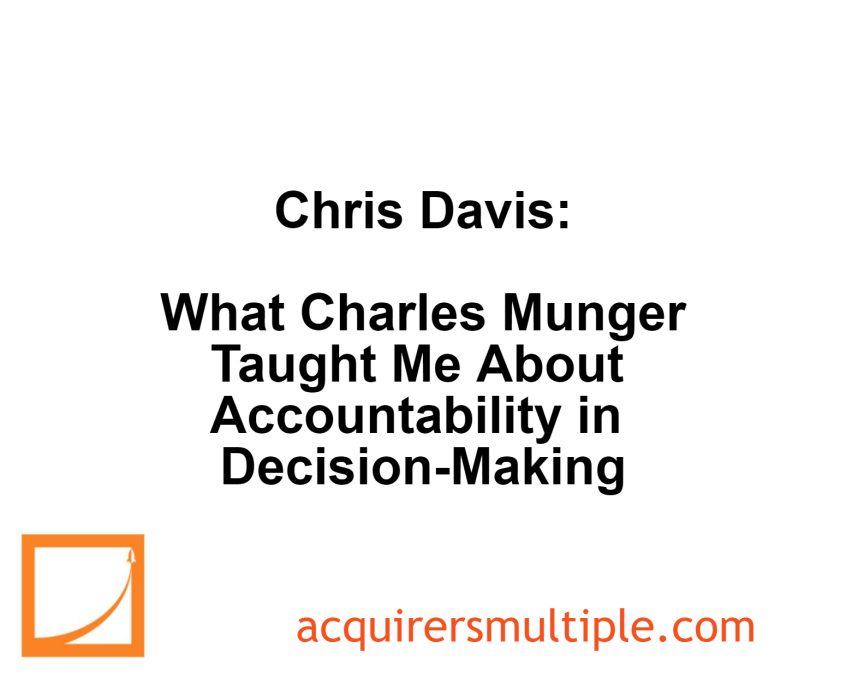In this interview with TIP, Chris Davis discusses the lessons he learned from speaking with Charles Munger on accountability in decision-making. Here’s an excerpt from the interview:
Davis: Well, it goes, I mean, it goes so much back to what we were talking about immutability and this relationship between how we can improve ourselves.
And as you said, you changed your wiring and of course, our wiring has got this plastic nature and is capable of, it is not at the extremes. I mean, right. We all know. I mean, what clinical depression is something very serious but this idea of, the connection of our physical environment, our physical bodies to our mental state.
Of course, those things are related. C. S. Lewis wrote an interesting essay I read a long time ago about praying. And he said, people have this view. I can pray any time I don’t need to be on my knees. And he made a very strong case that you should be on your knees because the connection between our brains and our bodies is strong enough that position, which is, of course, a position of incredible submissiveness affects our wiring.
In a much more modern interpretation, there was a in the early days of the idea of internet video, it was streaming, there was, at that time, laptops wasn’t really the thing, it was just desktops, and this skeptic said to me, well, nobody’s ever going to watch a movie on their computer screen, because when you’re on your computer, you’re leaning forward three degrees, and when you’re watching a movie, you’re leaning backwards three degrees, and you’re different people.
When you’re leaning forward, when you’re leaning back, you have different expectations, your sensory apparatus is working differently. Well, of course that’s true. Right now, it was wrong because then you can put your laptop in bed and lean back and read all sorts of things. But so I do think Charlie very early told me to put pictures in my office of people that I wouldn’t want to disappoint.
So that if I was on the cusp of making a decision that was in that gray zone, I might look around. And I might feel a little less comfortable making it I don’t think he expected that I would have a bronze bust of him in my office, which I in fact do, but you know, in my grandfather, I had Warren, Charlie, people that I admired and I wouldn’t want to disappoint.
And then Charlie said to me, when you create directors, you run a mutual fund that the relationship between you and your end investors is very tenuous. Not like Berkshire, where Warren sat at a table and knew his original investors. We work with financial advisors and, and he said, so have a board of directors that you’re proud and you’re proud of them and you don’t want to disappoint them and you certainly don’t want to mislead them.
Because they’re the face of your shareholders. And that’s how we ended up with people like Tom Gayner and serving in that capacity. Who do you want to report to? But you’re absolutely right. The symbolism, when we visit companies, we’re always looking for symbols.
Is there an executive cafeteria or do the executives eat, are there reserved parking spaces? Are there, the Palazzo’s and we’re always looking for those sorts of subtle cues. And so, of course, we’ve tried to internalize that ourselves. So you mentioned the wall of shame, and that’s probably a very good and tangible example. So we bring the stock certificates of our biggest mistakes and we put the transferable lessons because and we lead these mistake reviews as a team, Danton, my partner, and I lead those because I worked at other firms and I saw.
The success having a thousand fathers and failure being an orphan. And I worked for one individual that he just, it was always somebody else’s fault. And it was so clear that this man who was an incredible analyst was going to fail as a portfolio manager and as a businessman. Because, as a portfolio manager, he had a hard time revisiting his work.
And then as a business, he created a culture where people were afraid to admit their mistakes and had to pin the blame. And it was always the company lied to us or, somebody else’s fault. So, I think it’s a really useful thing.
You can watch the entire discussion here:
For all the latest news and podcasts, join our free newsletter here.
Don’t forget to check out our FREE Large Cap 1000 – Stock Screener, here at The Acquirer’s Multiple:



